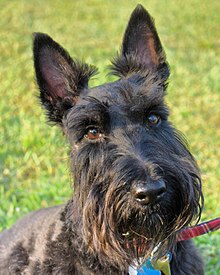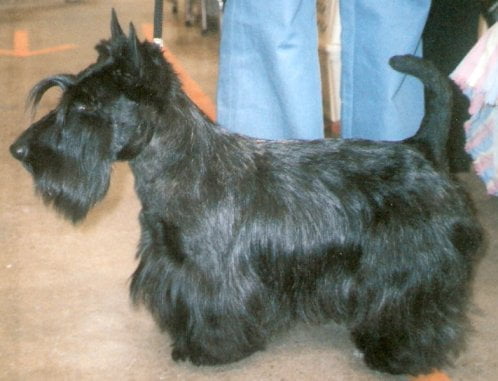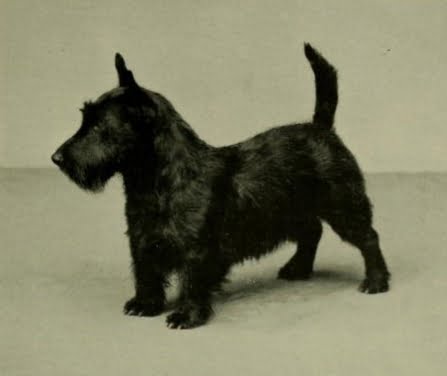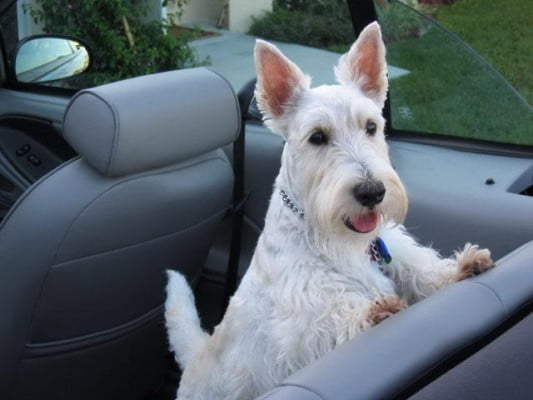
Distinctive and dignified, the Scottish Terrier, often affectionately referred to as the “Scottie,” is a small but sturdy breed that originated in the highlands of Scotland. Recognizable by its sharp silhouette, erect ears, and dense wiry coat, the Scottie was initially bred to hunt foxes and badgers. Their strong-willed and independent nature is tempered by a deep loyalty and affection for their families. With a distinctively brisk and assertive gait, these little terriers carry themselves with an air of confidence, embodying the old adage that size isn’t indicative of spirit.
The Scottish Terrier is a member of the AKC Terrier Group.
Breed Characteristics
| Dog Breed | Scottish Terrier |
| Breed Popularity (AKC) | 60 |
| Country of Origin | Scotland |
| Personality | Alert/Responsive |
| Life Expectancy | 12-12 yrs |
| Height | 10-10 in |
| Weight | 18-22 lbs |
| Color | Black, Brindle, Wheaten |
| Coat | double (hard wiry & soft undercoat) |
| Shedding | Occasional |
| Grooming | 2-3 Times a Week Brushing |
| Health Problems | Scottie Cramp, von Willebrand’s disease |
| Trainability | Independent |
| Exercise Needs | Regular Exercise |
Scottish Terrier History
Originating from Scotland in the 1700s, the Scottish Terrier, also known as the ‘Scottie’, was bred primarily to hunt foxes, badgers, and vermin. Its distinct rugged appearance and bold demeanor are a testament to its roots as a working dog in the harsh Scottish Highlands. Its ancestry is believed to include the Skye Terrier and the now-extinct Scotch Terrier.
Temperament
Scottish Terriers, affectionately known as ‘Scotties’, have a distinctive appearance and spirited personality. They are intelligent dogs with a hint of stubbornness, which can sometimes pose challenges in trainability. Their behavior leans towards being independent, but they are fiercely loyal to their families. They have a moderate energy level, enjoying short bursts of play. Early socialization is beneficial, especially to curb any potential aggressiveness. Barking tendencies are moderate, often used to alert their families to newcomers or potential threats.
Remember, while breed traits provide a general idea, individual dogs can have personalities that differ from the breed standard. Always spend time getting to know the dog and ensure their needs and temperament align with your lifestyle.
Grooming Requirements
Scottish Terriers have a dense, wiry coat that requires regular brushing to prevent tangles and matting. Bathing with a dog shampoo that’s formulated for coarse hair can help maintain the coat’s unique texture. Regular grooming tasks such as nail trimming, ear cleaning, and routine checks for skin issues should not be neglected.
Scottish Terrier Health
Scottish Terriers, with a lifespan of 12-15 years, often face health issues such as Scottie Cramp, a condition causing temporary muscle spasms, and Von Willebrand’s Disease, a bleeding disorder. Regular checks for hip dysplasia are advised. Essential health routines like vaccination, flea prevention, and regular deworming, combined with a balanced diet, will help ensure a longer, healthier life. Attention to potential allergies is also crucial for these spirited dogs.
Exercise Needs
Scottish Terriers, or “Scotties,” are spirited and independent. Daily walks and playful fetch sessions are ideal for their exercise needs. Trips to the dog park can offer playtime and socialization. Bonding through structured activities and games is ideal for their energetic yet reserved nature.
Training
Scottish Terriers, known for their distinct silhouette and bold personality, can benefit significantly from obedience training. Their independent streak makes clear commands essential, easing potty training and other basic disciplines. Crate training provides a haven for them, given their denning instincts. Addressing behavior problems early on is crucial, and regular socialization ensures they remain affable yet alert.
Scottish Terrier Pictures



Related Dog Breeds
More Dog Resources
Are you thinking about getting a puppy? Make sure to check out our list of important questions to ask before you adopt a puppy.
We also have many resources to help, from naming your puppy to socialization resources and training tips.
Take me back to the Ultimate Guide to Dog Breeds



